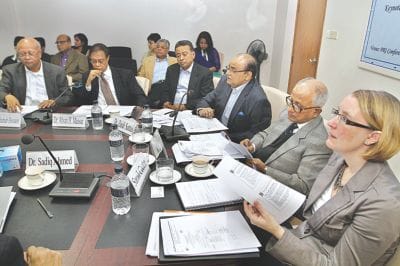Investment to drop further: study

Analysts attend the Policy Research Institute's quarterly policy brief on the economy, at the office of the research firm in Dhaka yesterday.Photo: STAR
Private investment is likely to drop at a higher rate than last fiscal year due to a lack of economic and political improvement, Policy Research Institute said yesterday.
Private investment declined 19.1 percent year-on-year in fiscal 2011-12, according to the research organisation.
"The outlook for private sector investment is that it is unlikely to rebound strongly in the period until the election," Ahsan H Mansur, executive director of PRI, said, citing weak domestic demand and the absence of a conducive business environment.
The remark came at the launch of the private research firm's quarterly policy brief on the Bangladesh economy, at its office.
Utility and infrastructure deficiencies and weak institutions and governance continue to remain major barriers to investment, the PRI said.
"All the economic and non-economic indicators are pointing to significant shortfalls in growth and investment for fiscal 2012-13 in comparison to the Sixth Five Year Plan targets," Mansur said.
The PRI said domestic demand has weakened in recent months due to low prices of rice, burst of stockmarket bubble, deflation in land and real estate prices, and sluggish construction activities.
Export demand is also likely to remain sluggish because of the continued Eurozone slowdown and slower than expected recovery of the US economy, Mansur said.
Buoyancy in remittance inflow, however, is likely to continue, facilitating domestic demand in the usual manner.
Along with a projected recovery in exports, Bangladesh's economic growth should still remain at around 6 percent in fiscal 2012-13, he said.
He also differed with the perception that interest rate on loans is high, and that it has been affecting investment.
The real average lending rate in Bangladesh was 2 percent in fiscal 2011-12, the lowest since 1990, Mansur said, adding that depositors had to accept the negative average real interest rate.
"So the hue and cry of the private sector is not justified," the economist said.
"Monetary policy should not be relied upon excessively to boost investment. While economy needs liquidity, its injection in excessive amounts is counterproductive."
Zahid Hussain, a senior economist at the World Bank's Bangladesh office, said the monetary policy announced by Bangladesh Bank last week might not yield the desired results.
He said institutional decays such as corruption, inefficient, risk-averse and highly-politicised administration and myopia of top politicians are the major bottlenecks to increased foreign investment flows.
Amir Khasru Mahmud Chowdhury, a BNP leader and former commerce minister, said institutional weakness is a major obstacle to investment.
“Politicisation of appointments in key positions in the financial sector is another problem."
Meanwhile, PRI Chairman Zaidi Sattar said trade policy needs to be reoriented to deliver high growth in the manufacturing sector. He said low tariff rate for intermediate and capital goods is inhibiting.
Mostafa Abid Khan, a member of Bangladesh Tariff Commission, stressed the need for separating policy formulation and implementation.
“The finance ministry sets the tariffs, but it should be the job of the commerce ministry.â€
Sadiq Ahmed, vice-chairman of the PRI, recommended proper monitoring and evaluation to see the impact of policy and financial support to the SMEs.
"A lot of funding is going on. In absence of follow-on data, it is impossible to even know if the financial support is reaching the targeted beneficiaries and achieving the intended results," he said.
Mahabub Hossain, executive director of BRAC, said consumption of fruits and vegetables has increased. "But we are grossly deficient with regards to quality food," he said.
Sarah Cooke, country representative of British government's Department for International Development, also spoke at the event.

 For all latest news, follow The Daily Star's Google News channel.
For all latest news, follow The Daily Star's Google News channel. 



Comments